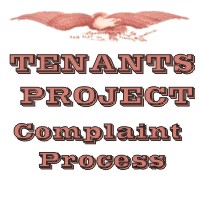
|
|
Complaint
Process |
Class Actions | HOME | Litigation |
Landlord Tenant Law |
CLE |
About the
Project |
CONTACT |

|

|
River City Property Management
COMPLAINT PROCESS
|
Start the Complaint Process APTS DOWNTOWN Tenant Complaint Form |
What To Do About Needed Repairs, Maintenance or Other Problems
Routine Requests
Complaint Process and Complaint Form
Pre-Complaint: Working with the Landlord and Keeping Records
Specific Problems
Unit or House Unclean on Move-in
Security Deposit Deductions
Repair problems
Breaking Lease
Bedbugs and Other Pests
Contacting the Tenants' Project
The Tenants' Project only handles complaints that come under the Iowa Landlord Tenant Act. The Tenants' Project does not handle complaints under federal law like Section 8 housing problems or complaints with regard to emotional support animals under the Americans with Disability Act.
Routine Repairs & Maintenance
River City Property Management and the Tenants Project encourage tenants with routine maintenance, repairs or other inquiries to first make a routine maintenance or repair request at info@rivercityprop.com or by calling 319-887-2187.
(2) Complaint Process & Complaint Form
If a routine maintenance/repair request or routine problem request doesn't resolve your problem, or you have a time sensitive or serious problem you can start the Tenants' Project/River City Complaint Process by by filing out a River City Complaint Form and e-mailing it to info@rivercityprop.com The landlord has 10 business days after you submit the online complaint form to resolve the complaint.
If the complaint is not resolved by the landlord with 10 business days after you submit the online complaint form, then the tenant can contact the Tenants' Project via e-mail. In an emergency or if tenants have a right to action by landlord within less than 10 days, the tenant may contact the Tenants Project before 10 days have elapsed. Tenants should include a dated copy of their initial complaint form to the landlord when they contact the Tenants' Project. Tenants can contact the Tenants' Project via e-mail at ictenantsclassaction@hotmail.com
The Tenants' Project will only represent tenants when their complaint is one that violates the Iowa Landlord Tenant Act and is fair and reasonable. In addition, there must be sufficient evidence to establish the complaint.
Under the consent decree if the complaint is well founded, tenants need to sign, scan as a pdf and return via e-mail a Tenants' Project retainer so they can be represented by the Tenants' Project. Once the complaint is found to be valid and the retainer signed and returned, the Tenants' Project's representation begins.
Your complaint will be assigned to a Tenants' Project attorney who will represent you in the case. Except under special circumstances, most interaction at the informal resolution stage between the Tenants' Project and tenant/client will be by phone or e-mail. The Tenants' Project tries to respond to all tenant/client communications within 48 hours. If you are having trouble communicating with your Tenants' Project attorney please contact the Tenants' Project at ictenantsclassaction@hotmail.com
The Tenants' Project will attempt to resolve the complaint informally with the landlord. If tenant and landlord agree, mediation is available. If the complaint cannot be resolved informally then the tenant can proceed with a small claims case. In order to proceed with a small claims case, the tenant must pay the filing fee and court costs, but all attorney fees for the Tenants' Project's representation of tenant are paid by the landlord.
(1) Don't lose your cool
Even if you are frustrated it does not help to get angry and lose your temper. This will definitely backfire. Just stay calm, see what the landlord says, and if you are not satisfied with the results, just contact the Tenants' Project. We may not be able to solve the problem, but we are on your side and will give you a straight answer so you know where you stand.
Also please do not say "The Tenants' Project said X or Y" to the landlord. You can mention that you have contacted the Tenants' Project, but to avoid misunderstanding and confusion, the Tenants' Project needs to speak directly to the landlord regarding the specific facts and law that apply to your situation.
(2) Create and keep evidence
Make sure you have a record of all your interactions with the landlord and have evidence of the problem. If you talk with the landlord on the phone or in person, follow up the conversation with an e-mail, summarizing what was said. Make a log of events, recording what happened, the time and date, who did what, and get the names and contact information of anyone you dealt with. Also make sure you have a copy of the lease and any communications received from the landlord.
If you just do one thing: TAKE LOTS OF PICTURES! Pictures are excellent evidence. Date stamped pictures are even better.
Having an independent witness, not family or fellow students, who is willing to testify in court, is probably the ideal evidence, though this may not be possible depending on the situation.
Without evidence, it is difficult to proceed with an informal complaint and it is almost impossible to go to court.
Specific Problems:
In addition to the specific situations listed below also check out the Rights & Responsibilities of Landlords & Tenants
(1) Unit or house unclean on move-in
If your unit or house has not been sufficiently cleaned on move in, immediately take lots of pictures of the state of the unit or house. Old houses or apartments may not shine like new houses and new apartments due to normal wear and tear of finishes. If additional cleaning is necessary make a request for additional cleaning by e-mail at info@rivercityprop.com or by calling 319-887-2187. You cannot break the lease just because the unit or house was not clean on move in. You have to give the landlord a chance to clean. Keep a log of events and follow up any phone calls or conversations with the landlord with an e-mail.
(2) Security Deposit Deductions
At the end of your lease, the landlord is entitled to charge your security deposit for unpaid rent and other charges due under the lease or Iowa Landlord Tenant law, like late fees. The landlord may also charge for the actual costs necessary to restore your unit to its condition at the beginning of the lease, ordinary wear and tear excepted. This means that the landlord must inspect the unit after tenants have moved out and determine if the tenants caused any damage or uncleanliness beyond ordinary wear and tear. Within 30 days after the end of the tenancy the landlord must either return your deposit to you or send an itemized list of deductions. River City will send the security deposit and/or itemized list of deductions to the designated security deposit holder and needs a working mailing address to do this.
Tenants should clean their unit or house carefully and remove all their possessions and any trash at the end of their lease. It is very important to TAKE LOTS OF PICTURES!!!! of the unit or house after everything has been removed and it has been cleaned. Without pictures you have no tangible evidence and it is very difficult to prove that you properly cleaned. Without pictures it is difficult to resolve an informal complaint regarding security deposit deductions for cleaning and almost impossible to do a small claims case.
If possible, it is good to be present when the landlord's inspector does their inspection. It is also a bonus to have a witness, preferable not a fellow student or family member, look at the unit or house after you have moved out and cleaned. They can then testify on your behalf if necessary. Pictures, however, are really the most practical evidence.
(3) Repair problems
Landlords are required to keep all appliances, electrical, plumbing, heating, AC, etc. systems running, plus keep the unit or house repaired. Landlords are not responsible for fixing damage caused by tenants or their guests and can charge tenants for damage negligently or deliberately caused by the tenant or their guests. If a repair is necessary, immediately take pictures of the problem and calmly contact the landlord by e-mail at info@rivercityprop.com or by calling 319-887-2187. Keep a log of events and follow up any phone calls or conversations with the landlord with an e-mail. Repairs need to be done within a reasonable amount of time.
(4) Breaking Lease
Both you and the landlord are obligated under the lease. It takes a significant violation of the Iowa Landlord Tenant Act to break a lease, either for a landlord or tenant, and the party violating the law gets a chance to fix the problem. Technical violations are not enough. Only a major Landlord Tenant Act or lease violation that goes uncured will allow you to break the lease. In addition, in order to terminate a lease, a 7 day notice, following the requirements of the Iowa Landlord Tenant Act needs to be served. Finally, landlords don't like tenants breaking their leases and are likely to refuse to refund the tenant's security deposit. The landlord is required to try to rent out the unit, once the tenant leaves, but if the termination was not warranted, can get damages for unpaid rent until they find a new tenant or the lease ends. If you are forced to break a lease due to illness, or circumstances beyond your control, you are still obligated under the lease, but it may be possible to reach a settlement with the landlord.
(5) Bedbugs and Other Pests
Pests and particularly bedbugs are a serious problem for both landlords and tenants. In Iowa City and in unincorporated areas of Johnson County, tenants of single family houses and single unit infestations in multi-unit buildings are legally the responsibility of the tenant, except where the owner has failed to maintain the premises in a pest proof condition. In Coralville, tenants are responsible for all pest control and extermination, again except where the owner has failed to maintain the premises in a pest proof condition.
